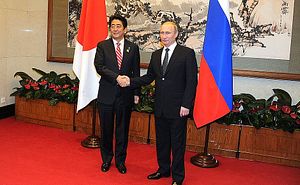During a bilateral summit meeting in Moscow on April 27, Japanese Prime Minister Shinzo Abe and Russian President Vladimir Putin sought to make concrete progress toward deepening trust, resolving the issue of the disputed Northern Territories (also know as the Kuril Islands), and concluding a peace treaty. As no peace treaty was signed between Japan and Russia in the aftermath of World War II, the two countries are still technically at war.
The question of sovereignty over four disputed islands was set aside (as expected), but several tangible steps were taken. Notably, Japan and Russia agreed that a joint public-private survey mission would be sent to the Northern Territories as early as May to research how the two countries can pursue economic cooperation. Areas of research for potential cooperation include fish and sea urchin farming and ecotourism. This step is in line with Abe and Putin’s December agreement to launch talks on joint activities on the islands.
Though the purpose of the research is to explore ways that economic cooperation can be strengthened through a “special system” that would not undermine either sides’ legal claim on the islands, there is skepticism in Russia about how benign Japan’s intentions truly are.
Washington is keeping a close eye on any developments in Japan-Russia relations, of course. According to Japanese officials, the purpose of the April 24 teleconference between Abe and President Donald Trump was to keep the United States in the loop. Abe’s summit with Putin was bookended by another, much more secretive, Abe-Trump call on May 1.
Japan’s policy toward Russia highlights how difficult it is for Japan to have a foreign policy independent of the United States’ preferences. Whenever progress is made in the Japan-Russia relationship, a black swan event – such as the Russian annexation of Crimea, or the U.S. cruise missile strike on Syria – threatens to undo it all.
However, in at least one regard, Japan is becoming less U.S.-centric: on the issue of North Korea, Japan showed a willingness to think of the issue outside the bilateral framework of the U.S.-Japan alliance by engaging Russian cooperation. During the joint press conference following the bilateral summit, Abe and Putin both called on North Korea and other countries to avoid behavior or rhetoric that could increase tensions around Pyongyang’s nuclear program and stated they had agreed to closely cooperate to try to help defuse tensions.
Cooperating with other regional powers does not mean Abe wants a return to the Six-Party Talks, which have been suspended since December 2008. Abe dismissed a resumption of the Six-Party Talks last Saturday, saying, “Dialogue for the sake of having dialogue will not lead to any solution.”
Furthermore, there are limits to how far Russia would be willing to make concessions on the North Korea issue. The launch of a regular ferry service between North Korea and Russia was delayed – likely in response to ongoing tension on the Korean peninsula – but will eventually start. The route, which will help strengthen the economic relationship between Russia and North Korea and undermine international efforts to sanction the regime, is too good of an opportunity for Putin to indefinitely pass on.
Despite their more limited leverage, due to the lack of connectivity to North Korea, it is undoubtedly a safer bet for Japan to work with European partners. The Mistral, a French amphibious assault carrier, sailed into Sasebo on Saturday ahead of drills next month near Guam. These exercises will involve Japanese, U.S., French, and British forces. Though the drills were planned before the April 29 failed missile test, as French ambassador to Japan Thierry Dana said, “Cooperation between our four nations in upholding laws, peace, and stability in the region will display our readiness to deal with North Korea.” Though the timing was unintended, the exercises are a positive sign of how Japan’s defense relationship with European partners can become institutionalized – a partnership that had long been seen as “exotic” and difficult to materialize.
The next meeting between Abe and Putin will be on the sidelines of the G20 meeting to be held in Germany this July. Much can happen between now and July, but with no end in sight for the turbulence derailing U.S.-Russia ties, Abe, who dreams of concluding the peace treaty that eluded his father, will have his work cut out for him trying to balance demands from Washington and Moscow.

































